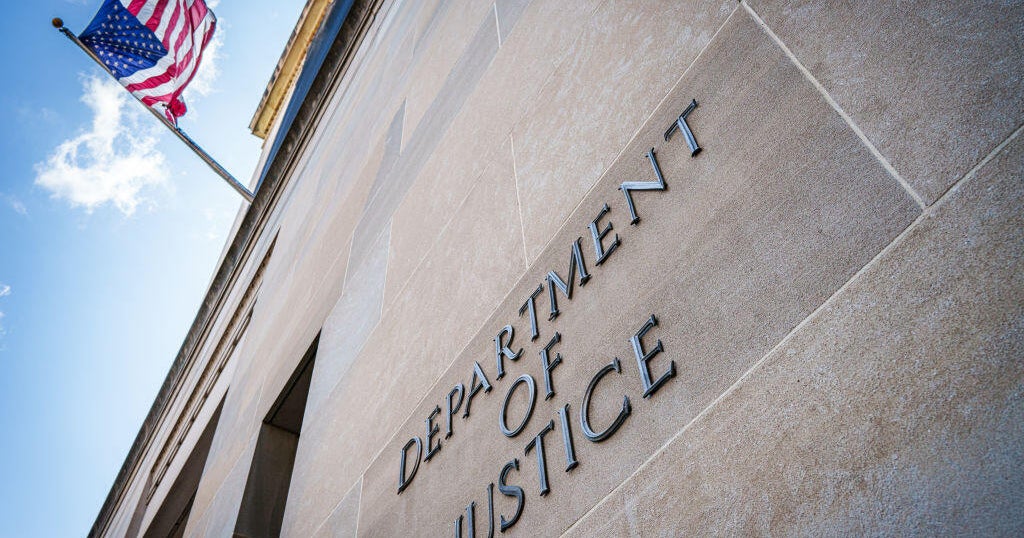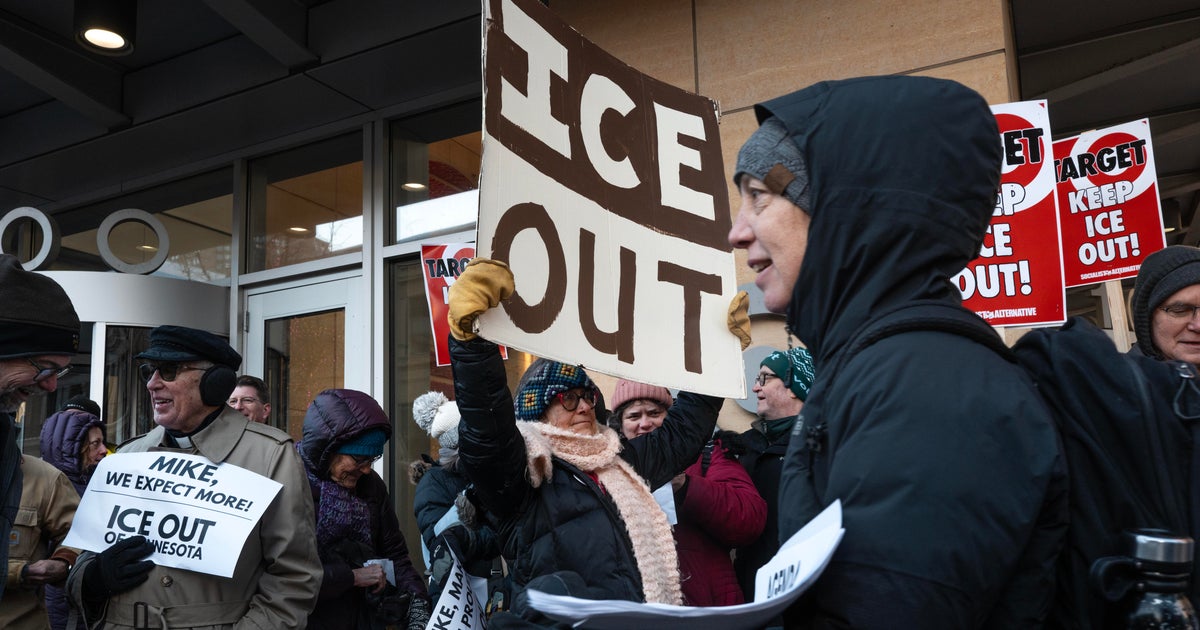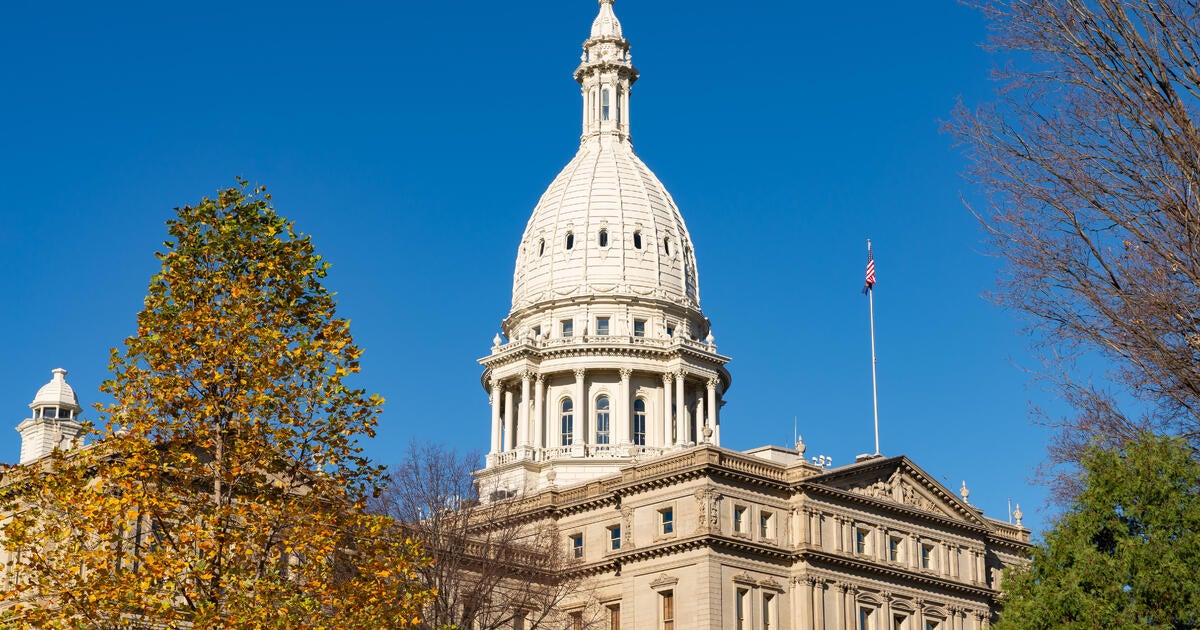Eli Lilly CEO David Ricks on treating coronavirus amid threat of new strains
In this episode of Facing Forward, Margaret Brennan talks with David Ricks, CEO of Eli Lilly, one of the largest pharmaceutical companies in the world that makes one of the few FDA-approved antibody drugs for COVID-19. In their conversation, Ricks talks about what the drug giant is doing to keep up with the evolving pandemic.
Highlights
On competition in the antibody treatment marketplace: "We all want the same thing, we want to erase COVID and given the constraint on supply for monoclonal antibodies, I'm glad they're working on this. And it shows the benefit of companies taking different approaches. So we could use Regeneron against that strain in ours against other strains...I think this all just highlights that, that the virus is moving. It's a changing picture. Its pace of change will be exactly consistent with how many people are infected. So the first priority is vaccination to reduce the number of people infected because the more people infected, the more changes that will occur naturally. And then we need science to keep track of carefully these emerging strains that require surveillance and doing genomic testing, which is not well done right now in the US."
On the US' preparedness for new strains of COVID-19: "I think we're not fully prepared. We were lucky that the UK strain occurred in the UK first and they have a much better surveillance system than we do. They made a decision early to sample 7% of all cases, and that's well set up. There's, you know, the U.K. response isn't perfect to this virus. They've had a lot of death and outbreak too. But that piece they had right and that strain appeared there. And so in some sense, we got lucky, and we're- we have medicines on the shelf that we tested early, like our monoclonal antibodies. We know the vaccines from Moderna and Pfizer already work against that strain. What we have to do is get these tools in the hands of doctors and get them in patients arms. That- that's fortunate because if something like the Manaus, Brazil strain was that one, we probably wouldn't have detected it and we wouldn't- we know we don't have the proper tools yet. So I think we need to not count on luck."
Download, rate and subscribe here: Apple Podcasts, Spotify and Stitcher
"Facing Forward": Eli Lilly's David Ricks transcript
Producers: Richard Escobedo, Kelsey Micklas
Research producer: Shani Benezra
MARGARET BRENNAN: I'M MARGARET BRENNAN AND WELCOME TO FACING FORWARD. THIS WEEK, PRESSURE IS RAMPING UP TO VACCINATE AMERICA AS THE CDC DIRECTOR WARNS… MORE CONTAGIOUS COVID-19 STRAINS ARE FOUND IN THE U-S.
*SOT*
CDC DIRECTOR RACHEL WALENSKY: The variants that have been identified recently seem to spread more easily, they're more transmissible.
MARGARET BRENNAN: NEW CONCERNS ARE MOUNTING OVER WHETHER THESE VARIANTS COULD EVADE ANTIBODY TREATMENTS, ONCE SEEN AS A BRIGHT SPOT IN FIGHTING THE DISEASE.
*SOT*
DR. ANTHONY FAUCI: A little bit more concerning with -- the mutant that is now prevalent in South Africa, particularly its negative impact on some of the monoclonal antibodies that have been given for treatment
MARGARET BRENNAN: THESE TREATMENTS WERE USED TO HELP FORMER PRESIDENT DONALD TRUMP AND FORMER NEW JERSEY GOVERNOR CHRIS CHRISTIE WHEN THEY WERE DIAGNOSED WITH COVID-19. THESE LAB-MADE ANTIBODIES ARE SIMILAR TO THOSE IN PATIENTS WHO RECOVERED FROM COVID-19, AND GIVE YOUR IMMUNE SYSTEM A BOOST TO FIGHT OFF THE VIRUS.
ELI LILLY - ONE OF THE LARGEST PHARMACEUTICAL COMPANIES IN THE WORLD MAKES ONE OF THE FEW F-D-A APPROVED ANTIBODY DRUGS. AHEAD - WE'LL SPEAK WITH THE COMPANY'S C-E-O, DAVID RICKS -- ABOUT WHAT THEY'RE DOING TO KEEP UP WITH THE EVOLVING VIRUS. WE'LL BE RIGHT BACK.
***
MARGARET BRENNAN: Eli Lilly CEO David Ricks joins us now. Welcome to the program.
CHAIRMAN & CEO OF ELI LILLY DAVID RICKS: Great to be with you today.
MARGARET BRENNAN: It's so good to have you on the podcast. We spoke on FACE THE NATION a few weeks ago, and I know a lot has been happening. Your treatment helped to reduce the chance of hospitalization from COVID-19 by 70%, but you have to give it within the early stages of the disease. As I understand it, if you are already hospitalized it's basically too late for the monoclonal antibodies to work. Is that right?
RICKS: That- basically right, MARGARET. Yeah, we have now two settings where we have data and- and the emergency use authorization that's approved already is for the first 10 days after a positive test. Now it's- some of the patients in that study might have been hospitalized within the first 10 days. So it's not exactly right that hospitalized patients couldn't get it. But first 10 days after the test and we- we've worked with the FDA to define a high risk group. Those that are over 65 or have other preexisting conditions are really the target patients for- for the medicine.
MARGARET BRENNAN: We've heard a lot of concern in recent days about these mutant strains for lack of a better term of COVID, specifically the B1351 strain out of South Africa. It may evade vaccines and even these monoclonal therapies. I want to play a sound bite for you of what Dr. Fauci told reporters on Wednesday.
*SOT*
DR. ANTHONY FAUCI: Now I want to make one mention about the monoclonal antibodies because they are more seriously inhibited in the sense of impacting on their efficacy by this South African strain. That's the reason why there will be attempts to develop even other antibodies that might be able to avert this particular problem.
MARGARET BRENNAN: So can you translate that? Does your treatment work against B1351 from South Africa?
RICKS: Yes, well we don't know the answer definitively. But what Dr. Fauci's saying there is consistent with data I've seen from independent labs, and our own laboratories where we do experiments in test tubes basically to assess the question is- is the response diminished with the mutations in the South African variant. Just to step back, there's three emerging variants we're all talking about, the- the Kent, U.K. one, South Africa, and now this one out of Brazil. To be clear, though, the Kent, U.K. one both our monotherapy and the new data on combination therapy we suspect fully neutralize this no differently from the other types. And that's actually the wave we- we worry about right now, hitting the US because it's been so successful in Europe. That strain it's coming here.
MARGARET BRENNAN: Just to clarify, Kent U.K., that's B117, right?
RICKS: Correct.
MARGARET BRENNAN: Okay.
RICKS: Yeah. B117, which is now the predominant strain in the U.K. and across Europe and is present in at least 25 states in the US, growing rapidly because it's about 50% more contagious. But that strain we- we have strong data to suggest we will be equally effective against. The Southern Hemisphere ones you're speaking about, Brazil and South Africa, have more changes in them. And based on our early experiments, I would agree with what Dr. Fauci says. These monoclonal antibodies are likely going to have reduced activity against those two strains. But it is also possible, as he said, to create new medicines, new monoclonal antibodies that will neutralize it. And in fact, there's one on the shelf already from a comp- another company called Vir, where we announced this week we're starting an experiment with them so that a combination of family bamlanivimab- our monotherapy, plus the Vir antibody will be tested and that could be effective against South Africa and the Brazil variant.
MARGARET BRENNAN: So if you collaborate with those companies to- to get those treatments combined, how long will it be before we know the results of the study that's underway?
RICKS: This study we're doing now will be a few months. The benefit of using an off the shelf one that's already been through other phases of testing, is we- we probably could supply it and ramp it up more quickly. In addition, MARGARET, we've said this week we also have our own novel, a new model monoclonal antibody that we think on paper should neutralize both South Africa and Brazil. And so that will take more like six to nine months.
MARGARET BRENNAN: So your competitor Regeneron said this week that it's cocktail of antibodies does work, they think, against the B1351. What's the difference between what they're creating and what you are talking about?
RICKS: Right, I know they said that. I wouldn't call them a competitor, we all want the same thing, we want to erase COVID and given the constraint on supply for monoclonal antibodies, I'm glad they're working on this. And it shows the benefit of companies taking different approaches. What I have seen from the published experiments and there was an experiment published this week, it is true they maintain more potency, but there was some reduction in potency with their combination against the South African strain, the B135 that you mentioned. I think this all just highlights that, that the virus is moving. It's a changing picture. So the first priority is vaccination to reduce the number of people infected because the more people infected, the more changes that will occur naturally. And then we need science to keep track of carefully these emerging strains that require surveillance and doing genomic testing, which is not well done right now in the US. And- and then we'll need help from some regulatory authorities like the FDA to allow us to do basically what we do with the flu shot every year. Where companies can change parts of that shot to keep up with the change in the virus without doing long term large scale studies, because we're pretty confident that the science translates and with the safety, the approach. I think we're getting close to that with monoclonal antibodies and we'll need regulators to help us with a pathway there.
MARGARET BRENNAN: So we spoke on FACING FORWARD last week with the CEO of Illumina, which is one of those companies that does the surveillance and the- the sequencing that you're talking about. And- and he was pretty stark. I mean, he said what- we're- we're only sequencing 0.3%. We need to be at 5% of cases to actually kind of even know what's happening within US borders with- with this virus. So, I mean, from where you sit is enough attention being paid right now to this, is enough funding being thrown at this? Because the CDC says it's aware, but those numbers aren't really moving up that quickly.
RICKS: I agree with- with his comments. But just to step back, first of all, this cannot just be a US thing. We've seen this virus moves and jumps continents much faster than we can control borders. So the idea that we can shut down all the borders and contain it, unless we want to live in a society where we really have a lot less freedom, it's just not a reality with this- this virus and probably other respiratory viruses. So we really need a network across the developed economies where people are mostly traveling to and from to- to catch this. The second thing I'd say is- --is the public health infrastructure in our country is in a- in a poor state. And I think that was fully exhibited during the early stage of the pandemic and the poor testing capacity. It wasn't until the private sector and other labs spun up. We need more base infrastructure in public health in the country. And that would include this kind of surveillance that you're talking about.
MARGARET BRENNAN: Just to- just to sort of bottom line this for people listening, at this point, is America prepared for these mutant strains, because it kind of sounds like you're saying we're not, but we're trying to catch up.
RICKS: I think you have it right. I think we're not fully prepared. We were lucky that the UK strain occurred in the UK first and they have a much better surveillance system than we do. They made a decision early to sample 7% of all cases, and that's well set up. There's, you know, the U.K. response isn't perfect to this virus. They've had a lot of death and outbreak too. But that piece they had right and that strain appeared there. And so in some sense, we got lucky, and we're- we have medicines on the shelf that we tested early, like our monoclonal antibodies. We know the vaccines from Moderna and Pfizer already work against that strain. What we have to do is get these tools in the hands of doctors and get them in patients' arms. That- that's fortunate because if something like the Manaus, Brazil strain was that one, we probably wouldn't have detected it and we wouldn't- we know we don't have the proper tools yet. So I think we need to not count on luck.
MARGARET BRENNAN: OK. Don't go anywhere. The conversation continues with Eli Lilly CEO Dave Ricks. And ahead, we'll discuss the challenges with administering the antibody treatment.
*COMMERCIAL*
MARGARET BRENNAN: So your company announced this week it has evidence that the monoclonal antibodies can be administered to those in nursing homes who've been exposed to the virus but haven't yet tested positive. So does that mean it can be used as a prophylactic to prevent COVID-19?
RICKS: We believe the study we announced this week in nursing homes does prove it can be used as a prophylactic very effectively to prevent outbreaks in nursing homes. We built mobile pharmacies that drove around looking for outbreaks, and then we set up in these homes and administered prophylactically our drug or placebo and then measured whether the disease spread in nursing homes. We need to protect our seniors, and we could give monoclonal antibodies. In this case, when one patient was infected, we would then give it to every other resident in the- in the nursing home. And we not only proved we reduce their risk of getting covered by 80%, the- the disease was less severe and actually there was an imbalance in death so that four patients who received placebo actually died in the study versus zero who got the drug. So we're saving lives as well. Those numbers are small, but you know it's indicative of the benefit in this setting.
MARGARET BRENNAN: So when we spoke last time on FACE THE NATION, you described that your drug needs to be administered by infusion through an IV. Is- is that still a bottleneck to getting wide use of the therapies? Should people who are infected or exposed to COVID have an alternative site to go if they want to receive your treatment?
RICKS: It remains a challenge. When we spoke, I think we were seeing that of the shipments we made to hospitals of the therapy, about 20% of it was being used in the week it was sent. That number has doubled since we spoke. So that's a pretty good improvement. But 40% isn't 100%, so there's still a long way to go. The good news is we have many areas of the country that are demonstrating great practices. And interestingly, MARGARET, these aren't the places where, you know, of, you know, famous hospitals and leading world experts. They're communities that- community hospitals that just organized to do it. In Northern Alabama, the hospital system there has set aside space in every single hospital. They staffed with nurses and they're one of the busiest hospitals in the country in terms of using the monoclonal antibodies to prevent infection. El Paso converted their convention center to an infusion center and- and the city funded it. It's making a big difference there.
MARGARET BRENNAN: So what would your advice be to the federal government, right? We have a new administration. We have the Biden administration and they say they're trying to help iron out some of these kinks in the system. What- what's the lesson learned from what's worked in some of these localities?
RICKS: I think three things. The first is- is to make the bet on the therapy. Right. It's- this wasn't easy, but of course, there's a sense of desperation. We had Phase 2 data and submitted it for emergency use. And experts, including at the NIH as well as in infectious disease societies, said, oh, it's interesting data, but we're not yet ready to fully endorse. We hope the data we released this week, which was the nursing home study, plus a very large Phase 3 study for treatment that showed a ten to zero death benefit, along with 70% reduction in probability of hospitalization, will move them. And I think we need, you know, doctors pay attention to those endorsements. That's important. The second thing is, as we were just talking about, you need people to rearrange resources. And I think we've learned through this pandemic in the US, we have a lot of capacity and expertise in our healthcare system. We're not good at moving it around. We- we're not flexible. And the final thing is the federal government is talking about coming on top of the local vaccination effort with some impressive national efforts. For instance, setting up vaccine centers at NFL stadiums and tents with National Guardsmen who can vaccinate people. We need a similar kind of thing for therapy as well, in particular in the states that are experiencing really tough outbreaks. Maybe we don't need it all the time, but when there's- the hospital system's overflowing, we need federal help to come in with extra resources.
MARGARET BRENNAN: Okay, we're going to take a quick break, so stay with us. You're listening to FACING FORWARD.
*COMMERCIAL*
MARGARET BRENNAN: So Eli Lilly reports earnings Friday, which is the day that this podcast airs. Just to note for our listeners that we're speaking before that financial release. Just big picture here, President Biden campaigned on this pledge to raise the corporate tax rate. It's currently at 21%. You've got offices all around the world. How would your company be impacted if the tax rate is raised again?
RICKS: Yeah, it's a good question. We hope it's not. You know, I think we lobbied and we're very supportive of the reduction because previously the US was at 35%. This has a direct effect on where we place investments. What had happened in the pharmaceutical industry is almost all of the manufacturing sites that were built in the last 20 years when the tax rate was high were overseas. And there's been a lot of reporting on other parts of the medical supply chain that broke down in the pandemic. The same is true. So raising the corporate tax rate in- in our industry would be the exact opposite of the policy goal of repatriating manufacturing as well. Since that tax rate changed, I'll share with you, we have announced and broken ground on a very large new facility in North Carolina. We've expanded Indianapolis and New Jersey, and I think we'd have to reevaluate that if the tax rate went up. Now, it could go up a few points. Does that really change things? Not so much. But to think about going above Europe or above major developed nations would be, I think, a grave mistake.
MARGARET BRENNAN: So the US is the only industrialized country without a national paid leave mandate. The Treasury secretary recently said that plus the lack of childcare support is hurting the economy right now in the middle of this pandemic, particularly when it comes to unemployment among women. Do you think there should be a mandate?
RICKS: Well, maybe our actions speak better than- than anything. Lilly has expanded our maternity and paternity benefits, so the paternity benefit is four weeks. Maternity benefit now goes a full six months paid. Not only do we think that's good for retention of top talent, but as a healthcare company, good for the baby. And I'll share- just, MARGARET, a personal story. You know, my wife's a pediatrician and we had one of our children while on an overseas post in a country that had one year paid maternity leave. And we saw the difference from our first child where we- my wife is at home three weeks and then had to go back to work versus a full year. Huge difference. So I think it's also just a compassionate thing to do. So whether we need a mandate, I just hope companies do it. And of course, small employers struggle more. And maybe that's where the federal intervention would help. But we're certainly for expanding maternity leave.
MARGARET BRENNAN: And when you take a step back and you look at the Operation Warp Speed project that the Trump administration put in place, you know, they trumpeted reducing some of the regulatory barriers, subsidizing private companies to help create vaccines. Is there architecture that they put in place that you would encourage the Biden team to keep?
RICKS: Yes. You know, plenty of things went wrong in many countries and including in this one in the early pandemic response, but one thing that went well, from my perspective, is the Operation Warp Speed effort. Which really was kind of an above agency effort to rebalance the normal balance of risk and benefit for the interaction between agencies and- and companies and really make sure that we could get therapies and then vaccines to the public as quickly as possible, given the situation. And it was successful, I think much more successful than any other country I can think of. But- but the streamlining and debottlenecking of the regulatory process, which can be slow and cumbersome. But, what- as it relates to medicines and vaccines we're seeing now is sporadic and not so good execution of getting these medicines to people. And that part needs improvement. And I would really encourage the Biden administration to focus there.
MARGARET BRENNAN: Thanks for your time today. I appreciate you sharing your insights.
RICKS: Of course, great to be with you.
Patients and physicians can visit covid.infusioncenter.org or the HHS Therapeutic Distribution locator to find a potential treatment location, or visit combatcovid.hhs.gov to find out more about antibody therapy. For more information about the use of bamlanivimab in the U.S., people may contact Lilly's 24-hour support line at 1-855-LillyC19 (1-855-545-5921).




